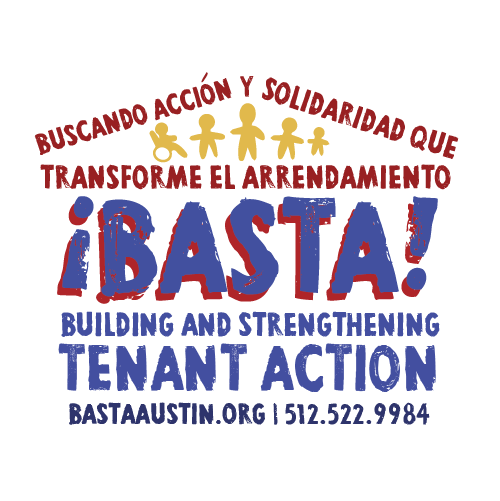Overview of Tenants’ Rights
Whether you live in market rate or subsidized housing you have rights and protections as a tenant in Texas. On this page, you will find information about those rights and protections and additional rights available to tenants who live in subsidized housing.
All tenants in Texas have these rights & protections
Right to repairs. You have a right to repairs that affect your health and safety Examples include: broken stove, leaks, lack of hot water, etc. You shouldn’t have to pay for them unless you or your guest caused the problem. Check out our Evidence Collection Tips and Written Repair Request guide to help get your repairs taken care of in a timely manner.
Right to report health and safety issues to the City. You can call the City of Austin at 3-1-1 to file a complaint with the city Code Department. Check out our How to File a Code Complaint guide.
Right to record. You can record management with your phone or camera. Texas law allows you to record someone without them knowing you are recording as long as you are part of the conversation.
Right to go in front of a judge before being evicted. A landlord cannot force anyone to evict without a direct order from a judge order.
Right to Request Reasonable Accommodation. Check out our Reasonable Accommodations Request form here.
Retaliation Protections. State law says a landlord cannot decrease services, evict you or not renew your lease during if the reason is because you have asked for a repair , participated in a tenant organization or complained to a government agency. These protections are in place for 6 months.
Parking/Towing Rules. Your landlord must give notice by mail or in person before changing parking and towing rules, and have a good reason to change them (that’s not just making more money).
Some things you should be aware of:
Always pay rent. You need to pay your rent, even when your landlord is not fulfilling all of their responsibilities. In Texas, there is no right to withhold rent because your landlord is not providing certain services or not maintaining the property.
Subsidized housing tenants have more rights & protections
Project Based Section 8
Project Based Section 8 housing is owned by private landlords, but tenants’ rents are subsidized by the federal government. Because of this, residents in this kind of housing pay a rental amount based on their incomes and have additional rights that many tenants in Texas do not have. In this kind of housing, the apartment itself is subsidized; if a tenant moves, they will not get to keep the subsidy (unlike with a Section 8 voucher).
Good Cause Lease Renewal & Eviction: Your landlord can only end or not renew your lease for a specific reason (like criminal activity, property damage, or not paying rent). A notice that your tenancy is ending does not mean you’ve already been evicted.
Rent is based on income. You should pay 30% of your income towards housing costs (including utilities). If you have no income, the landlord can charge you $25 and ask questions about how you’re meeting basic needs.
Notice before landlord entry to apartment. You must get a reasonable notice (usually 24 hours) before management comes inside your apartment, unless it is an emergency. If management hasn’t given you notice, you can tell them to come back later.
Complaints to monitoring agency. You can complain to Southwest Housing Compliance Corporation (SHCC) at 888-842-4484 if you think management isn’t following the rules.
Participate in a tenant organization. You can talk with your neighbors, kick management out of tenant meetings, invite tenant organizers to your property, and meet in the community room.
Notice before rent increase. Management must give you a 30-day notice before increasing your rent if you timely reported household or income changes.
Access tenant file. You can ask for the documents management has about your tenancy (you may have to pay for copies).
Some things you should be aware of:
Report income changes. Report any change in your income immediately. If you lose your income, you should not have to pay full rent; if you don’t report changes in income or household size, you can be evicted. Get something in writing confirming you reported a change.
Low-Income Housing Tax Credits (LIHTC)
Low Income Housing Tax Credit (LIHTC) housing is owned by private landlords and funded in part through tax incentives from the federal government. Because of this, rents in LIHTC housing are capped at an amount that is supposed to be affordable to households earning 50% or 60% of the area median income, and residents have some rights that other Texas tenants do not have. Tenants’ rent amounts are not based on their incomes, unless tenants also have a rental assistance voucher, like a section 8 voucher.
Good Cause Lease Renewal & Eviction: Your landlord can only end or not renew your lease for a specific reason (like criminal activity, property damage, or not paying rent). A notice that your tenancy is ending does not mean you’ve already been evicted.
Rent amounts are capped. Rents are capped at an amount that is supposed to be affordable to households earning 50% or 60% of the area median family income. (For example, the maximum rent for a 1-bedroom apartment in Austin in 2019 is $1100.) Rent limits can be found here.
Complaints to monitoring agency. You can complain to the Texas Department of Housing and Community Affairs (TDHCA) if you think management isn’t following the rules here.
Use of rental assistance voucher, like a Section 8 voucher. LIHTC landlords cannot reject tenants’ applications because they have a rental assistance voucher
